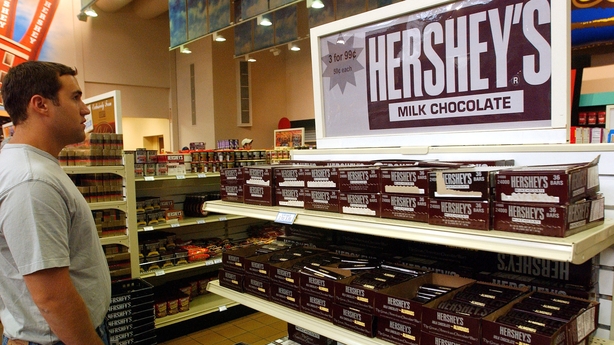Hershey last night said it had rejected a $23 billion takeover bid by Mondelez International that would seek to expand its limited US footprint and create the world's largest confectioner.
The snub underscores the challenges Mondelez CEO Irene Rosenfeld faces in wooing Hershey's controlling shareholder, the Hershey Trust,
This is a $12 billion charity created by the company's founder a century ago.
The maker of Hershey's Kisses and Reese's Peanut Butter Cups saw its shares trade above Mondelez's bid of $107 per share in cash and stock, indicating investors expected a new offer.
A merger of two of the world's top five confectionary makers would add Hershey's strong US business to Mondelez's global footprint.
Earlier, a source said that Mondelez had sought to provide assurances to Hershey that it would keep its name and preserve jobs.
Mondelez sees little competition risk given the limited geographic overlap of the two companies' businesses, the source added.
"The board of directors of the company unanimously rejected the indication of interest and determined that it provided no basis for further discussion between Mondelez and the company," Hershey said in a statement.
Hershey shares ended trading on Wall Street last night with a gain to 16.8% to close at $113.49, while Mondelez rose 5.9% to $45.51.
Mondelez, the maker of Oreos cookies, is the second-largest confectionary company globally, while Hershey ranks number five.
Their merger would put them in the top place at 18% of the market, according to market research firm Euromonitor International Ltd. The combined company would leapfrog Mars, which has 13.3% of the global market.
A fusion of the two would give Mondelez control over the production and distribution of Cadbury brand chocolates in the US, which Hershey currently holds the license to produce, paying royalties to Mondelez.
It would also give Mondelez the US production and distribution rights for Kit Kat, one of the most popular chocolate brands in the world, which industry sources said would be a significant boost to Mondelez.
Nestle manufactures Kit Kat worldwide, but Hershey has the rights in the US, paying Nestle royalties from sales. Mondelez's bid could put pressure on Nestle to consider its own bid for Hershey.
Upon change of control at Hershey, the license would revert back to Nestle for free, depriving value for a potential acquirer.
The bid pits Deerfield, Illinois-based Mondelez against the Hershey Trust, one of Pennsylvania's wealthiest charities.
The trust has about 81% of Hershey's voting rights and in 2002 prevented the Pennsylvania-based company from being acquired by Wrigley for $12 billion.

Pennsylvania's attorney general also sued to block the Wrigley deal, arguing it would hurt the local community.
Created by Hershey founder Milton Hershey to provide for the Milton Hershey School, a private school for children from low-income families, the trust has been the subject of an investigation recently by Pennsylvania's attorney general over conflicts of interest and mismanagement.
The trust's chief compliance officer was put on leave last month after a leaked memo showed the board had spent nearly $4m investigating conflicts of interest and insider-trading accusations against board members.
A top trust official was also sacked in May and pled guilty to wire fraud.

